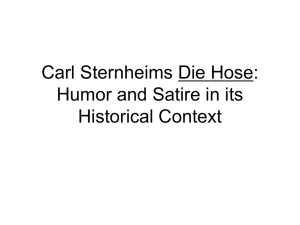ORIGINS OF WWI – HISTORICAL FORCE ESSAY
advertisement
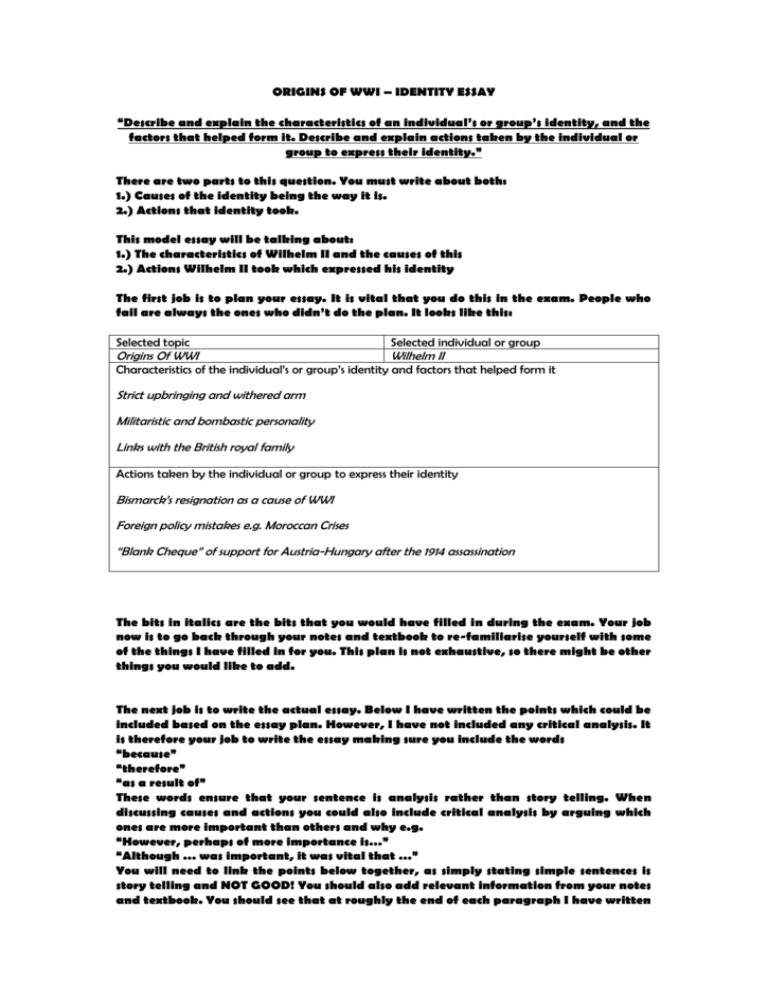
ORIGINS OF WWI – IDENTITY ESSAY “Describe and explain the characteristics of an individual’s or group’s identity, and the factors that helped form it. Describe and explain actions taken by the individual or group to express their identity.” There are two parts to this question. You must write about both: 1.) Causes of the identity being the way it is. 2.) Actions that identity took. This model essay will be talking about: 1.) The characteristics of Wilhelm II and the causes of this 2.) Actions Wilhelm II took which expressed his identity The first job is to plan your essay. It is vital that you do this in the exam. People who fail are always the ones who didn’t do the plan. It looks like this: Selected topic Origins Of WWI Selected individual or group Wilhelm II Characteristics of the individual’s or group’s identity and factors that helped form it Strict upbringing and withered arm Militaristic and bombastic personality Links with the British royal family Actions taken by the individual or group to express their identity Bismarck’s resignation as a cause of WWI Foreign policy mistakes e.g. Moroccan Crises “Blank Cheque” of support for Austria-Hungary after the 1914 assassination The bits in italics are the bits that you would have filled in during the exam. Your job now is to go back through your notes and textbook to re-familiarise yourself with some of the things I have filled in for you. This plan is not exhaustive, so there might be other things you would like to add. The next job is to write the actual essay. Below I have written the points which could be included based on the essay plan. However, I have not included any critical analysis. It is therefore your job to write the essay making sure you include the words “because” “therefore” “as a result of” These words ensure that your sentence is analysis rather than story telling. When discussing causes and actions you could also include critical analysis by arguing which ones are more important than others and why e.g. “However, perhaps of more importance is…” “Although … was important, it was vital that …” You will need to link the points below together, as simply stating simple sentences is story telling and NOT GOOD! You should also add relevant information from your notes and textbook. You should see that at roughly the end of each paragraph I have written [ANSWER THE QUESTION!] That means that you need to refer back to the essay question at that point. You should also add relevant information from your notes and textbook. When you have completed this essay you should hand it in for marking. When it is correct, you should learn it for the exam. Introduction Wilhelm II, the grandson of Queen Victoria of Britain, who became Emperor of Germany in 1888 after throat cancer ended his father’s three month reign, was an unstable and tactless man who was driven by an insatiable desire for a powerful navy and all the trappings of empire. The obstinacy which characterised his identity caused the resignation of Bismarck; the man who had created a balanced web of alliances in Europe. The ideas and actions of Wilhelm II caused a Naval Race with Britain, as well as the Schlieffen Plan’s preparations for a war on two fronts. Wilhelm’s vehement encouragement of the Austrian’s hard line stance against the Serbians after the assassination in 1914 was a direct cause of the First World War. Wilhelm II demonstrated the characteristics of strong Militarism, Imperialism and a contradictory nature which led to a lack of understanding about the chain of events he was creating in the run up to WWI. Main Body – Characteristics & Causes Wilhelm’s strict upbringing and his withered arm, which he always tried to conceal, were arguably contributing factors to his rabid sense of Militarism and Imperialism. His disability did not sit well with the notion of the Divine Right of Kings. It was perhaps because of this that Wilhelm joined the Prussian army. [ANSWER THE QUESTION!] Wilhelm’s erratic, bombastic personality was fuelled by his time in the military. He thoroughly enjoyed the uniforms and war games. This arguably influenced his Imperialistic and Militaristic attitude in future years. [ANSWER THE QUESTION!] The fact that he was related to the British royal family and was very fond of Queen Victoria does not appear to have affected the development of Wilhelm’s identity. He chose to threaten and alienate Britain with his policy of naval and colonial expansion and even supported the Boers in their fight against the British. [ANSWER THE QUESTION!] Main Body – Actions The actions of Wilhelm II after he became Kaiser further contributed to the formation of his identity in a number of ways. Only two years before he died, Wilhelm’s father Frederick wrote prophetically to Chancellor Bismarck expressing concern about how his son’s vanity and arrogance might damage foreign relations. It had extremely significant consequences that Wilhelm forced Bismarck to resign in 1890. The delicate web of alliances Bismarck had created began to break, and when Germany’s alliance with Russia lapsed France was quick to fill the vacuum. This encirclement of Germany made necessary the Schlieffen Plan, which drew Belgium, France and Britain into WWI in the aftermath of the assassination of Archduke Franz Ferdinand in Sarajevo in 1914. [ANSWER THE QUESTION!] Many Germans perceived Bismarck’s resignation as a pilot leaving the ship, which was a particularly apt metaphor bearing in mind Wilhelm’s Militaristic love of the navy. Admiral Von Tirpitz received huge support from the Kaiser in his build up of the German navy, As a tactless and arrogant man, Wilhelm failed to understand that his pursuit of a larger navy and a “place in the sun” for Germany actually menaced British commerce when there was no need to do so. Wilhelm’s “full steam ahead” identity can also be illustrated by his saber rattling actions during the 1905 and 1911 Moroccan Crises, as well as the 1908 Daily Telegraph Affair, when he demonstrated his lack of diplomatic talent and polarised the sentiments of the British against Germany. Wilhelm’s identity was also demonstrated in his 1900 “Hun Speech” to his soldiers leaving for the Boxer Rebellion in China, which proved to be first class propaganda material during WWI, portraying the German people as barbaric Huns. [ANSWER THE QUESTION!] Arguably the actions informed by Wilhelm’s impetuous identity which had the most far reaching consequences involved his response to the assassination in Sarajevo by the Black Hand. Regardless of Wilhelm’s reaction to his general staff’s mobilisation of the army, when he declared “Gentlemen, you will regret this”, Wilhelm himself was a significant cause of WWI. His Militaristic, saber rattling identity led him to issue Austria-Hungary with a blank cheque of support and it was this which allowed Austria-Hungary to force Serbia into war with an unrealistic ultimatum. [ANSWER THE QUESTION!] Conclusion There were a number of crucial factors which contributed to the formation of Wilhelm II’s identity, including a stern military upbringing and a disability which had no place on a man who ruled by the Divine Right of Kings. Wilhelm’s Militaristic, Imperialistic and tactless identity was demonstrated throughout his actions during the Naval Race with Britain, the Moroccan Crises and various diplomatic incidents. Wilhelm’s vehement desire for a strong navy and a “place in the sun” for his country threatened Britain, while his inept saber rattling put Austria-Hungary in a position where she could take on Serbia and plunge the world into war.
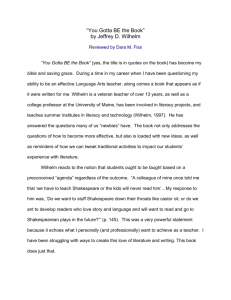
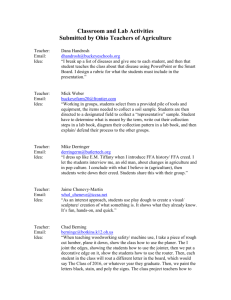
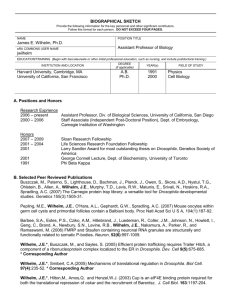
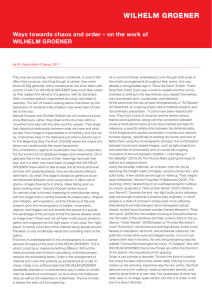
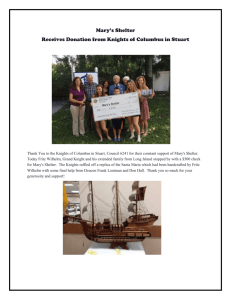
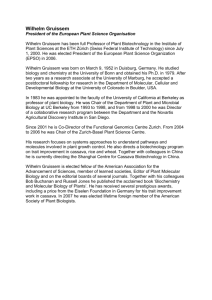
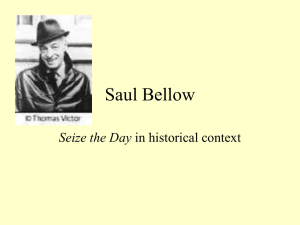
![Wilhelm & WW1 Essay [PDF Document]](http://s3.studylib.net/store/data/008331709_1-46bc78513ee6a8457564ef92c068442b-300x300.png)

